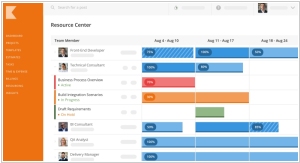JIRA vs Kantata
August 13, 2025 | Author: Michael Stromann
82★
JIRA provides issue tracking and project tracking for software development teams to improve code quality and the speed of development. Combining a clean, fast interface for capturing and organising issues with customisable workflows, OpenSocial dashboards and a pluggable integration framework, JIRA is the perfect fit at the centre of your development team.
8★
PSA software that supports your resource scheduling needs in real-time, from forecasting demand and managing your talent network to identifying skill gaps and employee opportunities. Allows to keep professional services projects on track and keep the bottom line in mind.
See also:
Top 10 Issue-tracking systems
Top 10 Issue-tracking systems
JIRA and Kantata are both cloud-based SaaS solutions for project and task management. They allow to establish team collaboration, optimize work processes, track time and project progress, generate analytics and reporting. They support third-party integrations to expand functionality.
But JIRA (launched in 2002) is an Australian service from Atlassian - originally an issue tracker, with project management capabilities. It is used in many industries: from software development to HR, marketing, IT support - thanks to flexible configuration and existence of many plugins (there is even an Atlassian Marketplace for extensions and plugins). Unlike Kantana, Jira supports a multilingual interface (English, Russian, Japanese, German, etc.).
Kantata (formed in 2021 by the merger of Mavenlink and Kimble) is primarily a PSA (Professional Services Automation) platform that integrates project, resource, time and financial management for service organizations. It is suitable for companies that are open to AI automation because it makes extensive use of AI for optimization, flexible resource allocation and margin management. The system is powered by the Salesforce platform.
See also: Top 10 Issue Trackers
But JIRA (launched in 2002) is an Australian service from Atlassian - originally an issue tracker, with project management capabilities. It is used in many industries: from software development to HR, marketing, IT support - thanks to flexible configuration and existence of many plugins (there is even an Atlassian Marketplace for extensions and plugins). Unlike Kantana, Jira supports a multilingual interface (English, Russian, Japanese, German, etc.).
Kantata (formed in 2021 by the merger of Mavenlink and Kimble) is primarily a PSA (Professional Services Automation) platform that integrates project, resource, time and financial management for service organizations. It is suitable for companies that are open to AI automation because it makes extensive use of AI for optimization, flexible resource allocation and margin management. The system is powered by the Salesforce platform.
See also: Top 10 Issue Trackers





